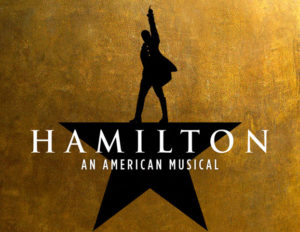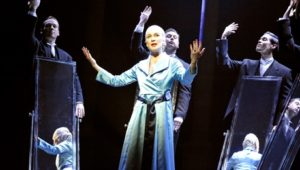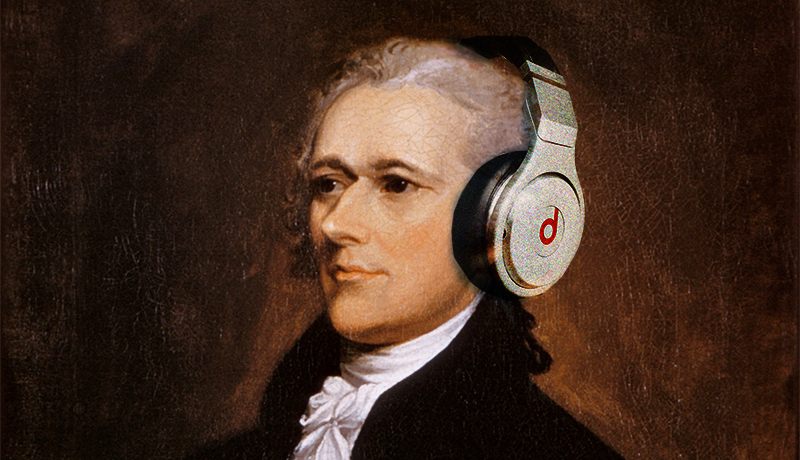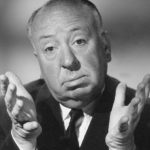Hamilton and History – Emilie Edgington
In modern society, some people view theatre as a form of entertainment for the elite. There is a social stigma behind going to see a show on Broadway or in the West End, coupled with a financial restraint. However, I believe that this needs to change. In my eyes modern day theatre shouldn’t be just for entertainment, it should also be regarded as a form of education.
The premise of ‘Hamilton’: An American Musical, sounds a bit like a desperate high school history teacher’s last-ditch effort to engage apathetic teens. However, before 2015, how many people knew who Alexander Hamilton was? When asked, the majority of Americans couldn’t answer despite Mr. Hamilton having been on the face of the $10 bill since 1929. Hamilton is one of Americas most influential and controversial founding fathers: he influenced America’s political system and was the first secretary of the treasury; he founded the first national bank, the US mint; and he was the main author of the George Washington administration’s economic policies.
So how do I, a British school girl with very little interest in history, know about all of this? The depth and extent of my knowledge of US politics in the late 1700s – think Washington, Lafayette, Madison or Burr – came about through listening to the words and lyrics of ‘Hamilton’. These inspired me to want to know more, to dig a little deeper. Thanks to Lin- Manuel Miranda, the history that I though was an “ancient” subject became alive and far more than memorising, catchy lyrics. A musical theatre piece allows you to look at a period of history through one persons’ eyes, and to explore how non-historians understand the past. I believe that history teachers and their students should be vying for the front-row seats at ‘Hamilton’. Not only is it an innovative and impressive stage production, it demonstrates a way to engage with history thoughtfully and creatively.
Miranda’s contribution to civic discourse and academic study must be recognised. Through ‘Hamilton’, he is exciting educators, historians and history enthusiasts all over the world. OK, for now this is mainly in the United States, but the show has already sold out in London despite not even opening until November (yes, I definitely have my tickets pre-booked). By putting history back into the public domain, Miranda’s ‘Hamilton’ is playing an important role in influencing how we remember eighteenth- and nineteenth-century American history.

People today may believe that theatre is just a form of art designed for public entertainment. However, wouldn’t you say that art always tells a story? No matter what painting, sculpture or song you look at there’s always further meaning and history behind it. This, to me, is what musical theatre today is; it is a form of art with the intentions of entertaining and educating audiences, it is purpose-driven entertainment.
But this isn’t just about ‘Hamilton’. ‘Evita’ has history embedded in its story and music, and teaches us that Eva Perón was the first lady of Argentina until her untimely death in 1951 from cancer. The basic order of events in ‘Evita’, written by Lloyd-Webber and Rice, is historically accurate, and is filled with real-life historical events, locations and people.
The 1977 Broadway musical ‘Annie’, which is based on the depression-era comic strip Little Orphan Annie, is one of the most beloved family musicals. We learn from ‘Annie’ that Herbert Hoover was the President of the USA before FDR and that Annie’s optimism leads Roosevelt to have a rosier outlook on the nation’s future, and Annie ends up inspiring “The New Deal,” a program enacted by Roosevelt and Congress that worked to end The Great Depression through relief (for the unemployed and destitute), recovery (of the economy) and reform (to prevent another depression). The tuneful inspiration is of course fiction, but Hoovervilles and “The New Deal” are historical facts.
Now you may argue against these points, noting how in ‘Evita’ they class Eva Perón as a famous lady who liked dresses and not someone who supported campaigns for women’s suffrage or created a Female Peronist Party, and that, in fact, Annie was just a cartoon character. Yes, these shows may not reflect history word for word, but it is the fact that musical theatre brings history alive, and makes you want to know and learn more, which I believe is more important.

People may argue that Broadway is just a business to attract tourists to see the shows which have the biggest lights and the best costumes. However, I believe that if those shows have a message and are able to be used to educate more and more people, then why criticise them?
I strongly believe that musical theatre can excite and enthral using both the music but also, more importantly, the story behind it. It can improve the understanding of language arts, especially to those like me who found history sedating and lifeless. Theatre is not just entertainment anymore, it’s expanding and reaching out to educate and inform those around it. The Gilder Lehman Institute of American history, a non-profit devoted to improving history education, was awarded a gift from the Rockefeller Foundation that has allowed 20,000 public school students in New York to see the musical ‘Hamilton’. And, to make this performance more than just a day out, they also provide online resources to help guide discussions no matter where you are located geographically.
It should come as no surprise that musical theatre fans pick up and retain factoids embedded in the lyrics and plots of broadway shows. History has its eyes on theatre, or perhaps it’s the other way around. For history nerds who love musicals these shows are a fun intersection of two passions, but for those of us who struggle to remember significant historical date and notable names, these shows have taught us more history than we ever could have absorbed in a classroom.
Are musicals historically accurate? Not entirely, but they can be used to excite and encourage further investigation and discovery. Can we expect a more accurate musical someday? Probably not, but for now let us absorb and delight in what we do have.















Post Comment
You must be logged in to post a comment.